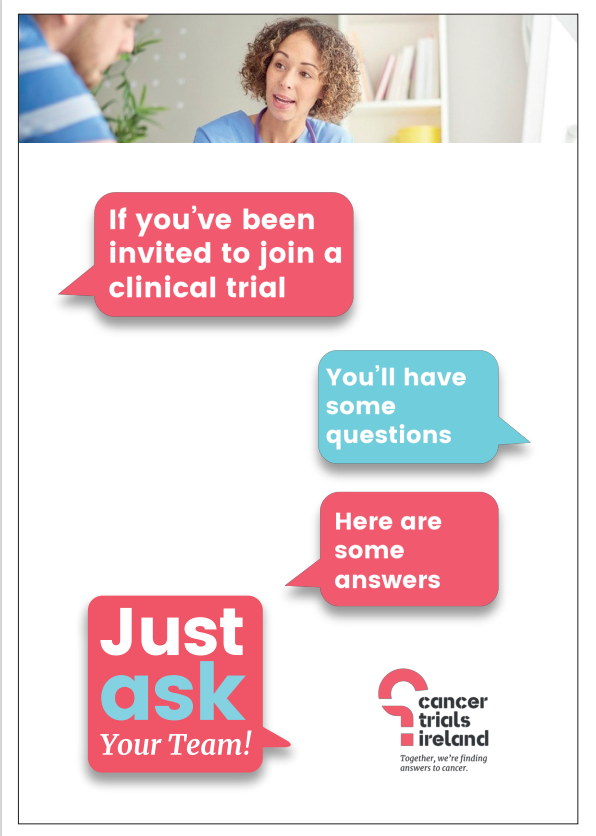
Your questions answered
Every family in Ireland has been touched by cancer. Thankfully, we have made huge progress in finding it and treating it. But there’s more to be done.
Many questions remain unanswered. Maybe you can help find the answers by taking part in a cancer trial.
Below are some answers to questions you may have about cancer trials.
If you have questions that are not answered here, please contact the Irish Cancer Society’s Cancer Nurseline freefone 1 800 200 700 or visit its website cancer.ie.
What are cancer trials?
Cancer trials look at new ways to prevent, detect, and treat cancer. They can also help improve the quality of life for people with cancer. Most trials involve testing new drugs, surgery, immunotherapy or radiotherapy treatments which show promise or new combinations of existing treatments. Cancer trials are highly regulated and follow a long and careful research process to make sure they are as safe as possible.
How would I benefit?
On a cancer trial you may receive access to a treatment, a combination of treatments, or a procedure not available as standard for your type of cancer. You would be closely monitored by your doctor, clinical research nurse or research radiation therapist, experienced researchers and the trial team. You may also be helping to find answers to cancer for future generations.
Are there drawbacks?
The treatment you would get during a trial may be different to what you would receive if you were not on a trial. There might be some side effects, some of which are not yet known. You might have to visit your hospital more often for blood tests, scans and other assessments.
How long do trials last?
Trials can take place over many years and may involve up to hundreds or thousands of patients. Each trial is different and the number of patients taking part and the length of time you would be on a trial depends on what was being tested.
When would I know the results?
When your trial treatment is complete you would continue to be monitored, sometimes over many years. This is so that the trial team can build up a reliable picture of the effectiveness of the treatment. When the trial is complete, the results would be published in a medical journal and available from your trial team. If new information relevant to your taking part in the trial became available during the trial, you would be kept informed.
Could I withdraw from a trial?
Of course. Taking part in a cancer trial is entirely voluntary; you can decide not to take part or if you do, you can withdraw at any stage. Your choice would not affect your relationship with your doctor or the care you would receive.
Would taking part affect the care I receive?
On a trial you are likely to receive more care as you would be monitored very closely and see your trial doctor and support team more often. You would have more opportunities to ask about your treatment, progress and general well-being.
Why are cancer trials important?
New and more effective approaches to cancer prevention, detection and treatment cannot be developed without cancer trials. All cancer treatments used today were once tested through a cancer trial. Cancer trials enable access to new treatments and help researchers increase knowledge on the best way to deliver these treatments. By taking part in a cancer trial you would be helping to test new ways to prevent, detect or treat cancer.
Can I take part in a cancer trial?
Cancer trials are not open for all types of cancer and are not always available in all hospitals in different parts of the country. Each trial has strict criteria for who can take part. For example, a trial might be for a certain age group, a particular type or stage of cancer, for patients with specific previous treatments, or may exclude patients with other certain conditions or illnesses. Your doctor can advise you of any cancer trials available for your disease type, either in the hospital where you are being seen or another hospital, and assess whether taking part in a trial is suitable for you and in your best interests.
Does it cost to join a cancer trial?
You will not be paid and you do not have to pay to take part in a cancer trial. If you require additional monitoring which, for example, involves giving blood samples or receiving scans or x-rays, these will also be included. You might not be reimbursed for travel, accommodation or other costs you may incur when on a cancer trial (there are some trials with reimbursements).
How can I find out more?
Just Ask Your Doctor! or your healthcare professional if there is a cancer trial currently available that would suit you. You can also find a list of open cancer trials here and you can call the Irish Cancer Society’s Cancer Nurseline on Freephone 1800 200 700.


